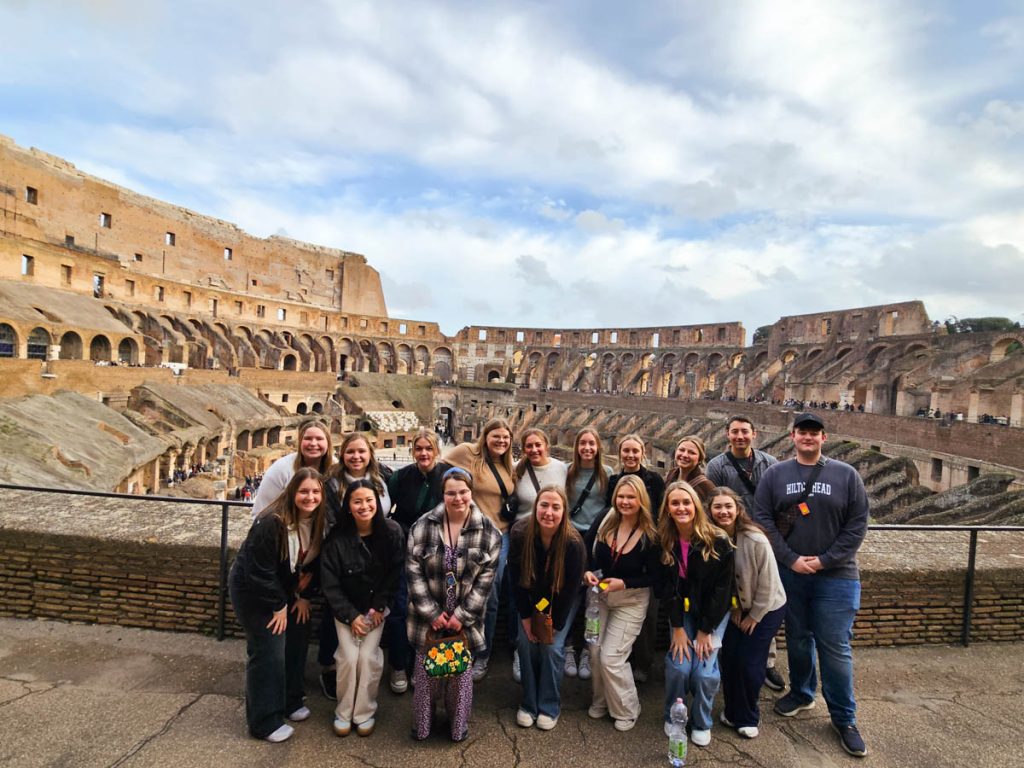Italian Food Culture & Sustainability

Travel through Rome and Florence to appreciate Italy’s cultural heritage and the role it plays in developing sustainable food systems. Immerse yourself in local culture and cuisine, including the making of the famous Parmigiano-Reggiano cheese and Balsamic vinegar. See the Vatican, Sistine Chapel, Pantheon and the Colosseum. Delight in the abounding piazzas, basilicas, statues and fountains Italy has to offer and enjoy a Roman food tour and a cooking class.
Quick Information
| Application Due | |
| Academic Date | (Program runs January of odd-numbered years) |
| Credit Hours | 3 |
| Requirements | 2.5 MU GPA at time of application. Good academic standing. Open to all MU students. |
| Estimated cost | $4,764* (doesn’t include airfare) |
| Contact | Shanon Dickerson, Director of International Study Programs |
Location
Italian cuisine ranks as one of the most sustainable in the world. Italy’s food culture emphasizes environmental stewardship, farmer-direct markets, and freshly produced food. Visit the U.S. Embassy to the United Nations Food Agencies in Rome, stay at a working farm in the Tuscan countryside and meet with several local producers.
Accommodation and Meals
Students will be housed in hotels and a farm. Rooms will be shared with 2 or more persons per room. All housing costs are included in the program fee.
Selected group meals are included in the program fee; however most meals will be out-of-pocket expenses for students. A detailed itinerary will be provided that clearly indicates which meals will need to be purchased. Though the individual spending habits of each student will vary, please see the budget information below for an estimate of the average out-of-pocket meal expenses.
Program Travel
International round-trip air travel will be arranged for the group. This arranged flight generally departs from and returns to Lambert International Airport in St. Louis, MO. Transportation to Lambert International Airport will be the responsibility of the student. The faculty program leaders, Deborah Finke, Ph.D., and Rocío Rivera, Ph.D., travel with the group flight to facilitate airport check-in and transfers. Because of the fluctuation in airline prices, the airfare estimate is listed separately below; however, once group reservations are made and the flight is finalized, the ticket cost will be added to the program fee and billed to participants’ MU accounts.
Academics
Students will be enrolled in three credits of AFNR 2191: International Agriculture, Food and Natural Resources (humanities; graded A-F) for the spring semester. Students should work with their advisors to determine how these credits will count toward their individual graduation plans.
Please be aware that there will be mandatory orientation classes prior to departure. The majority of these meetings will occur in the fall; late October and throughout November. Dates and times for the class meetings will be available shortly after the confirmed program participant list is finalized, generally around mid-October. Participants will be notified of the class meeting details via email.
Estimated Cost
MU Tuition (3 Credits; Spring Semester): Varies per student. See website for details.
| Non-refundable deposit: | $350 |
| Intl Center Fees: | $245 |
| Program Fees: | $4,169 |
| Total cost estimate without airfare: (includes accommodation and some meals) | $4,764 |
| Airfare estimate (does not include baggage fees): | $1,600-1,800 |
| Additional meals estimate: | $500 – 750 |
| Additional misc. estimate: | $250 |
Special Considerations
Navigating cobblestones or uneven terrain, travel to multiple locations during the program, navigating up to 5 miles per day with breaks, navigating up or down long flights of stairs with no access to elevators, travel by bus in hilly or mountainous regions that could lead to motion sickness. Visiting crowded museums with sometimes narrow passageways.